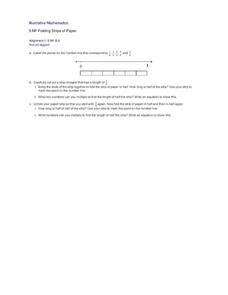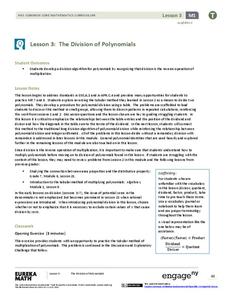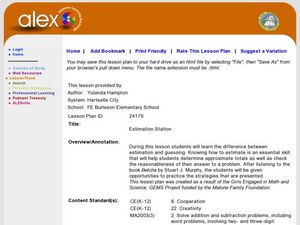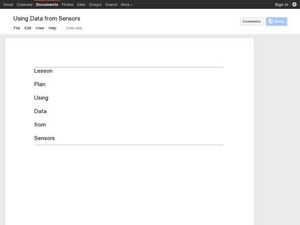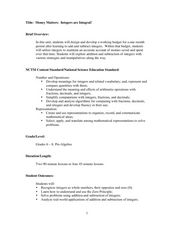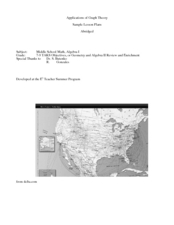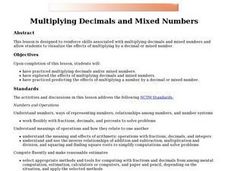Shodor Education Foundation
Algorithm Discovery with Venn Diagrams
Here is a lesson that takes an interesting approach to analyzing data using box and whisker plots. By using an applet that dynamically generates Venn diagrams, the class forms a strategy/algorithm for guessing the rule that fits...
EngageNY
Rational and Irrational Numbers
Back to the basics: learning how to add numbers. The 17th installment of a 35-part module first reviews addition techniques for rational numbers, such as graphical methods (number line) and numerical methods (standard algorithm). It goes...
Curated OER
Folding strips of paper
Fifth graders need concrete experiences to introduce a unit on multiplying fractions by fractions. A strip of paper is used to create a number line and represent 5/6. It is folded first in half, and then in quarters. After unfolding,...
EngageNY
Comparing Methods—Long Division, Again?
Remember long division from fifth grade? Use the same algorithm to divide polynomials. Learners develop a strategy for dividing polynomials using what they remember from dividing whole numbers.
Curated OER
Stochastic and Deterministic Modeling
Explore the difference between stochastic and deterministic modeling through programming. First have the class write algorithms for relatively simple tasks using pseudocode. Use the Python 2.7 program app to simulate Mendel's Pea Pod...
EngageNY
The Division of Polynomials
Build a true understanding of division of polynomials. Learners use their knowledge of multiplying polynomials to create an algorithm to divide polynomials. The area model of multiplication becomes the reverse tabular method of division.
Curated OER
Minutes and Days
Elapsed time is a skill developed by the single question that is the center of this activity. Fifth graders are asked to find out the time that is 2011 minutes after the beginning of 2011. This question addresses the standard that...
Curated OER
It's Not All Greek to Me
Learners find out the meaning for prefixes used in math vocabulary. By dissecting words used in everyday math, they figure out what the prefix indicates and what the word means. A variety of well-organized worksheets and activities...
Alabama Learning Exchange
Estimation Station: Why Estimating is Better than Guessing
Youngsters discover the difference between estimating and guessing. They estimate how many items are contained in a jar as they read a story. After the story, pupils discover the differences between estimating and guessing and create a...
Illustrative Mathematics
How Many Containers in One Cup / Cups in One Container?
The object is to model fraction division by asking “How many are in one group?” It is a difficult concept to understand, but developing the model that shows one cup to a certain amount of container or one container to a certain amount of...
Curated OER
Using Data from Sensors
Beginning with a discussion about using technology to collect data, this resource includes a video about the next Mars rover as an example. Young scientists are taught that filtering is necessary before collected data can be analyzed....
Curated OER
Multiplication Magic
Investigate multiplication problem solving strategies by working with base 10 blocks. Learners decompose problems with a Merlin the Magician theme. Multiple resources are provided.
Google
Surveys and Estimating Large Quantities
Looking for an estimation activity a bit more involved than the typical "guess the number of jellybeans in the jar" game? Here, learners use a picture to estimate the number of people at a large event, look for potential problems with...
EngageNY
The Power of Algebra—Finding Primes
Banks are responsible for keeping our financial information safe. Mathematics is what allows them to do just that! Pupils learn the math behind the cryptography that banks rely on. Using polynomial identities, learners reproduce the...
Education Development Center
Adding Fractions with Unlike Denominators
If the fractions don't have a common denominator, make them have one. Learners first read and analyze a conversation of pupils trying to add 2/5 and 1/2. They compare the process of adding fractions to the process of adding quantities...
National Security Agency
Money Maters: Integers are Integral!
A thoroughly-written lesson plan and a plethora of worksheets about integers comprise this resource. Neophyte number crunchers learn to recognize integers, add and subtract them, and apply the concepts to the designing of a personal...
Kenan Fellows
Dinner Party: Using Pattern Trains to Demonstrate Linear Functions
Nothing fancy here ... just your run-of-the-mill Algebra party! Learners explore the patterns of linear functions while designing seating arrangements for a dinner party. Comparing the number of tables to the perimeter of the combined...
Teach Engineering
The Fibonacci Sequence and Robots
What better way to introduce the idea of a sequence than with robots! An educational lesson explains the classic Fibonacci sequence before pupils build and program a robot to move. Additionally, the lesson challenges individuals to...
Curated OER
Application of Graph Theory
Students investigate different online tutorials as they study graphing. In this graphing lesson, students apply the concept of graphs cross curricular and use it to make predictions. They define the purpose and theories behind graphs.
Curated OER
An Introduction to Public Key Cryptography
Students secure information online using cryptography. In this algebra lesson, students use RSA technology to encrypt information on the internet. They use modular reduction of natural numbers to understand prime number theory.
Curated OER
Multiplying Decimals and Mixed Numbers
Students multiply decimals and/or mixed numbers. They explore the effects of multiplying decimals and mixed numbers. They practice estimating answers when a number is multiplied by a decimal or mixed number.
Curated OER
Probability and Statistics
Young scholars reason mathematically as they solve problems dealing with probability of an even occurring. In this probability instructional activity, students differentiate between different rankings of candidates running for...
Curated OER
Numerical Determination of Drag Coefficients
Pupils create a video of an object falling with a drag. In this physics lesson, students calculate drag coefficient using data from Logger Pro. They calculate velocity and acceleration of the object.


